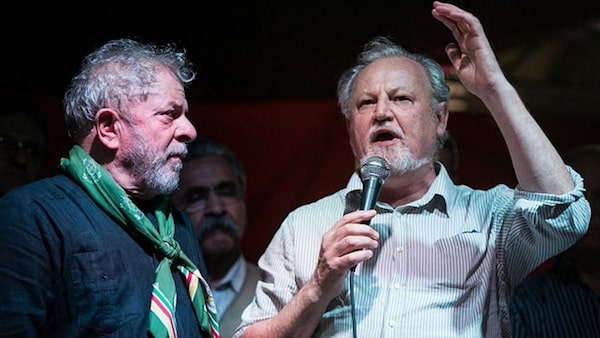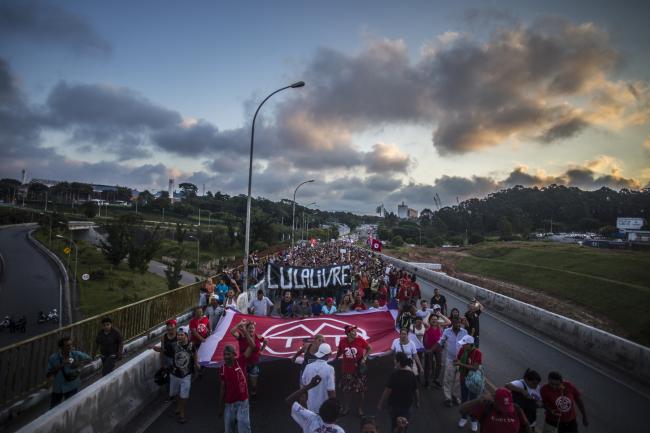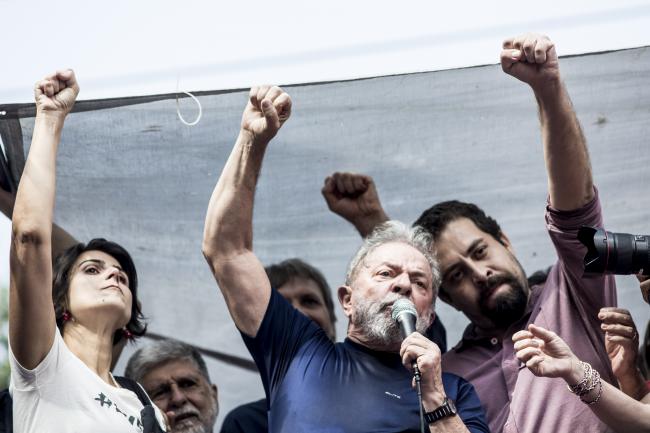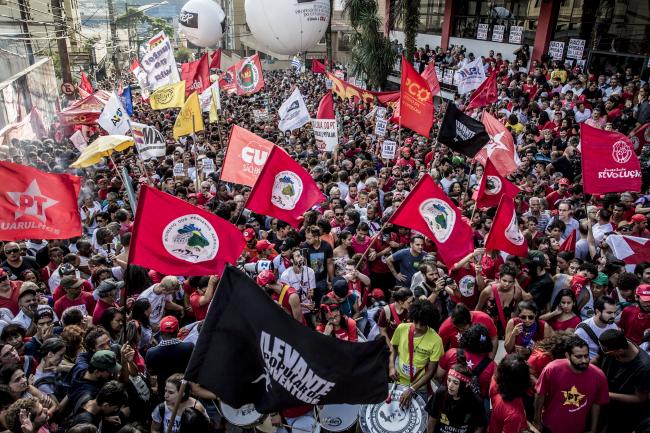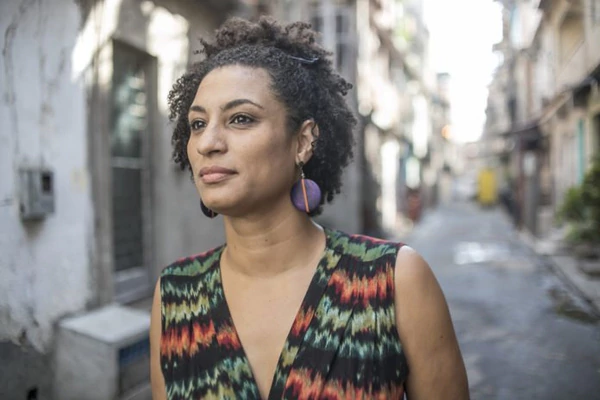Published 04/08/2018

Photo: Ricardo Stuckert
"In 1979, this union made one of the most extraordinary strikes, and we were able to make an agreement with the auto industry that was perhaps the best possible, and I had a factory commission with 300 workers. and I decided to ask the factory committee to go earlier to talk to the peaozada.I would hold a meeting in the morning to avoid having people drink a little bit in the afternoon, because when we drink a little, we get bolder .
I still could not avoid it, because the guy was carrying a quart of brandy into the suitcase, and when I got past it, I'd take a little "cannula" for my throat to get better - something that did not happen today.
Well, we started putting the agreement into a vote and 100,000 people at Vila Euclides Stadium did not accept the agreement. It was the best it could be. We did not miss a holiday, did not lose thirteenth and had a 15% increase. But the peaozada 'was' so radicalized that she wanted 83% or nothing. And we could not. And we spent a year being called a fighter by the workers. We, Guilherme, went to the factory door ... [Lula begins to make various greetings]. So, mates and companions, we got ... the workers did not approve the agreement ... [interruption to medical care the person in the crowd].
I was going to tell you that we could not approve the proposal that I considered good and the staff then went on to disrespect the union board. I went to the factory door and no one stopped.
And the press wrote: "Lula speaks to the poor ears of the workers."
It took us a year to regain our prestige in the category. And I was thinking with revenge: "The workers think that they can do 100 days of strike, 400 days of strike, that they go to the end. Well, I'm going to test them in 1980. "
And we made the biggest strike in our history. The biggest strike. 41 days of strike. With 17 days of strike, I was arrested. The workers began, after a few days, to strike. I know that Tuma, I know that Dr. Almir and I know that Teotonio Vilela went into jail and said to me: "Ló, you have to end the strike, you need to give an advice to stop the strike ". And I would say, "I will not end the strike. The workers will decide on their own. "
The concrete fact is that no one stood 41 days because, in practice, the companion had to pay for milk, had to pay the electricity bill, had to pay gas, the woman began to collect the bread, he then began to suffer pressure and could not stand it. But it's funny because, in defeat, we won a lot more without winning economically than when we won economically. It means that it is not money that solves the problem of a strike, it is not 5%, it is not 10%, it is what is embedded in political theory, political knowledge and political theory in a strike.
" It means it's not money that solves the problem of a strike, is not 5%, not 10% is what is embedded in political theory, political knowledge and political theory in a strike"
Now, we're almost in same situation. Almost in the same situation. I am being sued and I have clearly said, "The process of my apartment, I am the only human being sued for an apartment that is not mine." And he knows the Globe lied when he said it was mine. The Lava Jato Federal Police, when he did the inquiry, lied that it was mine. The prosecutor, when he made the accusation, lied saying it was mine. And I thought Moro was going to solve it and he lied saying he was mine and sentenced me to nine years in jail.
That's why I'm an outraged citizen, because I've done a lot with my 72 years. But I do not forgive them for passing on to society the idea that I am a thief. They gave primacy of the bandits to make a pixuleco by the whole Brazil. They gave the primacy of the bandits to call the people of petralha. They have given the primacy of creating almost a climate of war, denying the policy in that country. And I say every day: none of them, none of them, have courage or sleep with the calm conscience of the honesty, of the innocence that I sleep. Neither of them. [Applause]
I'm not above justice. If I did not believe in Justice, I had not made a political party. I had proposed a revolution in that country. But I believe in Justice, in a fair Justice, in a Justice that votes a process based on the proceedings of the process, based on the information of the accusations, of the defenses, in the concrete proof that the weapon of the crime has.
What I can not admit is a proxy who made a Powerpoint and went to television to say that the PT is a criminal organization that was born to steal Brazil and that Lula, being the most important figure of this party, Lula is the boss and therefore, if Lula is the boss, says the prosecutor, "I do not need evidence, I have conviction." I want him to keep his conviction to their cronies, to his minions, not to me. Certainly, a thief would not be demanding proof. He would be trapped with his mouth shut, hoping the press would not speak his name.
I have over 70 hours of National Newspaper grinding me. I have over 70 magazine covers attacking me. I have thousands of pages of newspapers and stories attacking me. I have more to Record attacking me. I have more of the Bandeirantes attacking me, I have the radio from the interior attacking me. And what they do not realize is that the more they attack me, the more my relationship with the Brazilian people grows.
"And what they do not realize is that the more they attack me, the more my relationship with the Brazilian people grows"
I'm not afraid of them. I have already said that I would like to have a debate with Moro about the complaint he made against me. I wish he would show me some evidence. I've already challenged the TRF4 judges that it was a debate at the university that they want, whatever course they want, to prove what the crime I committed in that country. And I sometimes get the impression - and I get the impression because I'm a dream builder. I long ago dreamed that it was possible to govern this country by involving millions and millions of poor people in the economy, involving millions of people in universities, creating millions and millions of jobs in that country. I dreamed, I dreamed that it was possible for a metallurgist, without a university degree, to take care of the education more than the graduates and bankers who governed that country. I dreamed that it was possible for us to reduce child mortality by taking milk beans and rice so the children could eat every day. I dreamed that it was possible to take the students from the periphery and put them in the best universities of that country so that we do not have judge and prosecutors only of the elite. Soon we will have judges and prosecutors born in the favela of Heliopolis, born in Itaquera, born in the periphery. We're going to have a lot of people from the Landless, the MTST, the CUT trained. Soon we will have judges and prosecutors born in the favela of Heliopolis, born in Itaquera, born in the periphery. We're going to have a lot of people from the Landless, the MTST, the CUT trained. Soon we will have judges and prosecutors born in the favela of Heliopolis, born in Itaquera, born in the periphery. We're going to have a lot of people from the Landless, the MTST, the CUT trained.
This crime I committed.
I committed this crime and they do not want me to commit any more. It is because of this crime that I have ten lawsuits against me. And if it is for these crimes, to put poor in the university, black in the university, poor to eat meat, poor to buy car, poor to travel by airplane, poor to do its small agriculture, to be microentrepreneur, to have its own house. If this is the crime I committed, I want to say that I will continue to be a criminal in this country because I will do much more. I will do much more. [People start shouting "Lula, Brazilian people's warrior]
"I dreamed that it was possible to take students from the periphery and put them in the best universities in that country so that we do not have a judge and prosecutors only the elite"
Companions and companions, I, in 1986, was the most voted constituent congressman in the history of the country. And at the time, there was a mistrust that had only power in the PT who had a mandate. Who had no mandate was had ... [begins to greet]. So, fellows, when I realized that the people suspected that it was only in the PT that I was a deputy, Manuela and Guilherme, do you know what I did? I stopped being a deputy. Because I wanted to prove to the PT that I would continue to be the most important figure of the PT without having a mandate. Because if someone wants to win me in the PT, there is only one way: to work harder than I am and to like the people more than I do, because if you do not like it, you will not win.
Well, we are now in a delicate job. I may live the moment of greatest indignation that a human being lives. It is not easy what my family suffers. It is not easy what my children suffer. It is not easy that Marisa suffered. And I want to say that the anticipation of the death of Marisa was the sham and the shamelessness that the press and the Public Ministry did against her. I'm sure. These people I do not think have children, have no soul and have no idea of what a mother or father feels when they see a son being slaughtered when he sees a child being attacked.
I then, mates, I decided to raise my head. Do not think that I am against Lava Jet not. Lava Jato, if you get a bad guy, you have to get a bad guy even if you stole it and arrest him. We all want it. All of us, all our lives, said, "Justice only arrests the poor, does not hold the rich." We all said it. And I want you to keep holding on rich. I want. Now, what's the problem? It's just that you can not make subordinate judgment to the press. Because, deep down, you destroy people in society, in the image of people, and then the judges will judge and say, "I can not go against the public opinion you're asking to hunt." If you want to vote based on public opinion, drop the toga and go to be a candidate for deputy, choose a political party and go be a candidate. Now, the toga is life-long employment. The citizen has to vote only on the basis of the case file, in fact I think that the Supreme Court minister should not give a statement about how he is going to vote. In the US, voting ends and you do not know who the citizen voted exactly so that he is not a victim of pressure.
"I want to say that the anticipation of Marisa's death was the sham and the shamelessness that the press and the Public Prosecutor did against her." He
imagines a guy accused of murder and not the murderer. What does the dead man's family want? Let him be killed, let him be condemned. So the judge has to have, unlike us, the cooler head, more responsibility to make the charge or to convict. The Public Ministry is a very strong institution. Therefore, these boys who enter very young, take a course right and after three years of competition because the father can pay, these boys needed to know a little life, a little politics, to do what they do in Brazilian society .
There is something called responsibility. And do not think that when I say this I am against. I was president and appointed four prosecutors and made speeches in all my possessions. I said, "The stronger the institution, the more accountable its members have to be." You can not condemn the person by the press and then try it. You are reminded that when I went to testify there in Curitiba, I said to Moro: "You can not absolve me because Globo is demanding that you condemn me and you will condemn me."
Well, I think that both TRF4, Moro, Lava Jet and Globo, they have a dream of consumption. The dream of consumption is that, first, the coup did not end with Dilma. The coup will only conclude when they manage to convince Lula not to be a candidate for the presidency of the republic in 2018. It's not that I will not be, they do not want me to participate because there is a possibility of each one to be elected. They do not want Lula back because poor in their head can not have right. You can not eat prime beef. Poor can not fly. Poor can not do university. Poor was born, according to their logic, to eat and have second-class things.
"They do not want Lula back because poor, in their head, he can not have right"
So, fellows and companions, the other dream of consuming them is the photograph of Lula imprisoned. Oh, I keep imagining Veja's excitement putting the cape on me. I keep imagining the excitement of Globo putting my photograph stuck. They will have multiple orgasms.
They have decreed my arrest. And let me tell you something: I'll take their warrant. And I will answer because I want to do the transfer of responsibility. They think everything that happens in this country happens because of me. I've already been sentenced to 3 years in jail because a judge in Manaus understood that I do not need a weapon, I have a bad language, so you have to shut up, because if I do not shut up, he'll keep saying phrases like I said, "Yeah. and the peasants killed a farmer and they thought it was the password.
They already tried to arrest me because of obstruction of justice, it did not work. They now want to get me in custody, which is a more serious thing, because there is no habeas corpus. Vaccari has been in jail for three years. Marcelo Odebrecht spent R $ 400 million and had no habeas corpus. I will not spend a penny. But I go there with the following belief: they will discover for the first time what I have said every day. They do not know that the problem of this country is not called Lula, the problem of this country is called you, the conscience of the people, the Workers Party, PCdoB, MST, MTST, they know that there are a lot of people.
And what our pastor said, and I have said in every speech, it is no use trying to stop me from walking this country, because there are millions and millions of Boulos, Manuelas, Dilmas Rousseffs in this country to walk for me.
It's no use trying to end my ideas, they're already hovering in the air and can not hold them.
It's no use stopping my dream, because when I stop dreaming, I'll dream of your dreams and dreams.
It is no use thinking that everything will stop the day that Lula has a heart attack, it's silly, because my heart will beat for your hearts, and they are millions of hearts.
It's no use thinking they're going to stop me, I will not stop because I'm not a human being, I'm an idea, an idea mixed with your idea. And I'm sure fellows like the landless, the MTST, the comrades of the CUT and the trade union movement know. And this is proof, this is proof. I'm going to fulfill the warrant and you're going to have to turn, each one of you, you're not going to call yourself kid, zezinho, joãozinho, albertinho ... All of you, from now on, will turn Lula and will walk around this country doing what You have to do it and it's every day! Everyday!
They have to know that the death of a combatant does not stop the revolution.
They have to know. They have to know that we are going to definitely make regulation of the media so that people do not fall victim to lies every single day.
They have to know that you, who knows, are even smarter than I am, and burn the tires you burn so much, march, occupy the countryside and the city. It seemed difficult to occupy St. Bernard, and tomorrow you will receive the news that you have gained the ground that you invaded.
"It's no use stopping my dream, because when I stop dreaming, I'll dream of you and your dreams"
Companions, I had a chance, now, I was in Uruguay, between Livramento and Rivera, and people said so you're going to go to the embassy of Bolivia, Uruguay, Bolivia and Uruguay, and you're going to go to Uruguay with Pepe Mujica and leave and do not come back, of Russia, and from there you keep talking ... "I'm no older. My age is to face them with an eye on the eye and I will face them accepting to fulfill the warrant.
I want to know how many days they'll think about holding me so tight. And the more days they leave me there, the more squids will be born in this country and more people will want to fight in this country, because in a democracy, there is no limit, there is no time for us to fight. I told my companions: if it depended on my will I would not go, but I will because they will say, as of tomorrow, that Lula is outlawed, that Lula is hiding, and no! I'm not hiding, I go there in their beard so they know I'm not afraid, that I'm not going to run, and for them to know that I'm going to prove my innocence.
They have to know that.
And do whatever you want. Do whatever you want. I'm going to pick up a phrase that I picked up in 1982 from a 10-year-old girl in Catanduva, and that phrase has no author:
The powerful can kill one, two or three roses, but they can never stop the arrival of spring.
And our fight is in search of spring.
They have to know that we want more house, more school. We want less mortality, we do not want to repeat the barbarity they did with Marielle in Rio de Janeiro.
We do not want to repeat the barbarity of black boys in this country.
We no longer want the mortality due to malnutrition in this country. We no longer want a young man to have no hope of entering a university, because this country is so stupid that it was the last country in the world to have a university. The last! All the poorer countries had, because they did not want the Brazilian youth to study.
"The powerful can kill one, two or three roses, but they will never be able to stop the arrival of spring, and our fight is in search of spring."
And they said that it cost a lot. One wonders: how much did it cost not to do 50 years ago?
I want you to know that I have pride, deep pride, that I was the only president of the Republic without having a university degree, but I am the president of the Republic who made the most university in the history of this country, to show these people not to confuse intelligence with the amount of years in schooling, this is not intelligence, it is knowledge.
Intelligence is when you have sides, intelligence is when you are not afraid to discuss with your colleagues what is a priority, and the priority is to ensure that this country regains citizenship. They will not sell Petrobras! Let's make a new Constituent! Let's repeal the oil law that they so doing! We will not let BNDES sell, we will not let Caixa sell, we will not let Banco do Brasil destroy! And we will strengthen family farming, which is responsible for 70% of the food we eat in this country.
And with that belief, comrades, with your head held high, as I am speaking to you, that I want to get there and tell the delegate: I am at your disposal.
And the story, in a few days, will prove that the one who committed crime was the delegate who accused me, it was the judge who judged me and it was the Public Prosecutor's Office that was frivolous with me.
Therefore, comrades, I have no place in my heart for everyone, but I want you to know that if there is one thing I have learned to like in this world, it is my relationship with the people.
When I take one of you, when I hug one of you, when I kiss one of you ... because now I kiss man and woman just like that ... When I kiss one of you, I'm not kissing with ulterior motives, I'm kissing because when I was president I said,
"I'm going back where I came from."
And I know who are my eternal friends and who are the eventual ones. The little ones, who were behind me, now disappeared. And those who are with me are those companions who were my friends before I was president of the Republic. He is the one who ate rabbits in the Zion, who ate chicken and polenta in the Demarchi, is the one that took Zocodo's broth, they are still our friends. They are those who have the courage to invade land to make a home, are those who have the courage to strike against social security, are those who occupy in the countryside to make a productive farm, are those who, in fact, need the state.
Companions, I'm going to say something to you: You'll realize that I'm going to get out of this bigger, stronger, truer, and innocent because I want to prove that they're the ones who've committed a crime, a political crime of pursuing a man who has 50 years of political history, and for that I am very grateful.
I can not repay the gratitude, affection, and respect you have given me over the years. And I want to tell you, Guilherme and Manuela, to you both, that it is a proud thing for me to belong to a generation, which is at the end of it, to see two young men fought for the right to be president of the Republic in this country. So, big hug, and you can be sure: this neck does not go down, my mom has already made a short neck so it will not go down, and it will not go down, because I'm going to leave with my head up and stuffed, because I I will prove my innocence.
A hug fellow, thank you, but thank you very much, so you helped me, a kiss, dear, thank you
http://lula.com.br/integra-do-discurso- ... o-bernardo
Google Translator made hash of this powerful speech.
